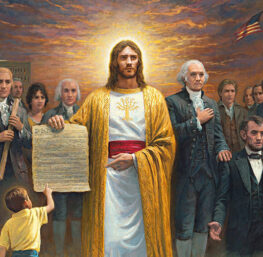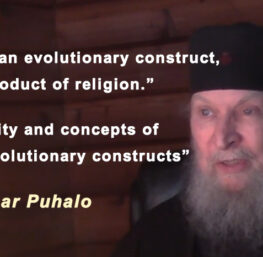Townhall.com | Ken Connor | May 6, 2007
For quite some time in America, frank public discussions about candidates’ religious views have been deemed verboten. The trend began in 1960, when John F. Kennedy found that his Catholic faith was proving to be a liability with Protestant voters. Kennedy was the first Roman Catholic to run for president since Al Smith’s landslide defeat in the 1920s, and throughout the campaign he met significant resistance from detractors who were deeply suspicious of the Catholic faith. Hundreds of anti-Catholic tracts were sent to millions of homes across America discouraging voters from supporting Kennedy. Many refused to vote for the young Senator from Massachusetts because they did not agree with his religious beliefs, and this created a crisis for the campaign.
In response to this crisis, Kennedy delivered a famous speech to hundreds of Protestant pastors at the Greater Houston Ministerial Association. In this speech, Kennedy essentially said that his faith would have no affect on his decision-making. For Kennedy, religion was a “private affair” that should not influence a president. At one point Kennedy said, “I believe in an America where the separation of church and state is absolute – where no Catholic prelate would tell the President (should he be Catholic) how to act, and no Protestant minister would tell his parishioners for whom to vote…” Kennedy then went on to say:
I do not speak for my Church on public matters – and the Church does not speak for me. Whatever issue may come before me as President – on birth control, divorce, censorship, gambling, or any other subject – I will make my decision in accordance with these views, in accordance with what my conscience tells me to be in the national interest, and without regard to outside religious pressures or dictates. And no power or threat of punishment could cause me to decide otherwise.
In trying to alleviate the fears of many voters that to elect a Catholic as president would put America under the Pope’s control, Kennedy forcefully distanced himself from his church. He essentially said he was Catholic, but that voters should not worry. Kennedy claimed that he would not be influenced by church teachings on a variety of issues, and that he would follow his own conscience instead. What JFK did not explain is why anyone should trust his conscience any more than the church’s.
. . . more




Well, he was elected President by the population of the USA; yes or no, it was what the people wanted and what they believed in at that time.
Sincerely,
J R Dittbrenner
Actually, he was only elected President because the mayor of Chicago commited election fraud in his favor.
“Kennedy claimed that he would not be influenced by church teachings on a variety of issues, and that he would follow his own conscience instead. What JFK did not explain is why anyone should trust his conscience any more than the church’s.”
We have to make a distinction between a public official whose worldview has been formed in part by the teachings of the church vs. a public official who acts as a de facto representative of the church. In other words, people have a right to know who they are electing, how the person makes decisions, and who the person actually represents. If a candidate knows up front that, for example, if elected all of his decisions will be based on the teachings of the church, then people have a right to know that.
“In the decades since Kennedy’s famous speech, radical separation of church and state has become the prevailing model for many in America. Candidates are eager to suggest that they are personally religious, but at the same time that their religion won’t play any role in their governance. “
It’s not that religion won’t play any part in their governance, but that they are not bound or obligated to govern in a manner that is 100 percent consistent with their religion.
“In other words, the naked public square prevents political leaders from discussing life’s most important questions in public. The answers to questions like “What is your view of God?” and “What do you perceive to be the nature of man and the meaning of life?” cannot help but have an impact on one’s political outlook.”
But what that leads to is the “religionization” of politics. We’ll end up with a kind of religious test for public office — a religious test that is not de jure but de facto. When candidates debate the death penalty, I want to hear a debate based on the Constitution, justice, the realities of the legal system, and so on. I don’t want to hear candidates debating what God thinks about the death penalty.
“How we view God inevitably determines how we view our fellow man. And how we view our fellow man determines how we will treat him.”
That’s not true at all. Theological views are but one component in moral decisions. George Bush can talk a good case. He has all the “right” beliefs. But it would be difficult to argue that he is more compassionate than someone coming from a more secular perspective.
“The public square has been denuded and public discussion of life’s ultimate questions is considered heretical. Consequently, voters often have little appreciation for the foundational assumptions that determine how leaders will use the power they are given.”
Has this guy been living in a cave the last six years? The religious right spends billions of dollars a year ensuring that voters know about the foundational assumptions.
There have, of course, been notable exceptions, such as Jimmy Carter, who declared that he was “born again”, and George W. Bush, who has been roundly criticized for acknowledging Jesus Christ as the most influential person in his life and for “wearing his faith on his sleeve”.
It is interesting to see how the “notable exceptions” mentioned in the article could not be more polar opposites in their political views.
It may also be worth mentioning that the two “notable exceptions” were (JC) and are (GWB) “notably” un-popular with the American people.
You can’t please all the people all of the time…
Well, the two greek congressmembers are certainly following this advice, to the dismay of the greek people in the US.
This has become a really important issue. It’s hasn’t gone unnoticed that the five justices on the Supreme Court who are Roman Catholic voted unanimously to uphold the ban on partial birth abortion. Predictably, they were later accused of promoting Catholic dogma over Constitutional protected freedom. Once critic attacked them, writing:
http://salon.com/opinion/feature/2007/05/11/kissling/
First, I think what’s wrong with this statement is it’s implied rejection of the idea that an unborn child has rights as well, rights that the law must consider.
Second, it cannot be denied that much of our public policy and law is built on a foundation of morality and ethics originating in religion. While I wouldn’t want the law to be an exact mirror of the views of any single religious denomination, there are moral principles that are widely enough accepted within our population that they should also be reflected in our public policy and application of our laws. Opposition to the partial birth abortion procedure has never been solely a Catholic concern.
Note 6. Here’s an example of the intellectual bankruptcy of the left. Rather than engage the flawed concept of viability, they hold it as fact and construct the recent ban against partial birth abortion in terms of a Roman Catholic conspiracy.
This is the best they can come up with? Apparently so.
Father: Here are some excerpts you will appreciate from Bowling Alone: The Collapse and Revival of American Community by Robert D. Putnam , which I just started reading.
So – here is a very important thing a nation loses as it moves toward a more secular society and supress religious values, it loses a powerful driver of altruism, charity and civicengagement and community involvement
Dear Mr. Bauman,
#2
What can I say, It is the American way, Chicago or Florida; something about somebody’s Ox…or something like that.
Sincerely,
J R Dittbrenner
Note 8. Sure. Seeing this stuff up close and personal I can vouch for its accuracy, anecdotally anyway. There’s something about the tone of the piece a bit disquieting, as if no real difference exists between a church and, say, the Lions Club, but then sociologists tend to measure all activity, no matter how diverse, with the same yard stick.
JR, Even if one grants that what happened in Florida in 2000 was an attempt to steal the election (admitedly nothing new in American politics) what was different between 1960 and 2000 (again granting that 2000 was fraud which I don’t) was the reaction. Richard Nixon, not exactly known for his altruism, decided not to contest the election in anyway specifically because he did not want to cast doubt on the legitmacy of the U.S. governement. Nixon felt it would harm the country. The Republican Party followed his lead. Gore and the Democrats however not only contested everything, but to this day, many of them claim Bush is an illegitimate President.
I bring it up simply to remind those, like Dean Scourtes, who seem to hold such a position, that the Democrat power was founded upon an event which is historically much easier to prove as election fraud than anything that happened in Florida.
J R Dittbrenner writes: “What can I say, It is the American way, Chicago or Florida; something about somebody’s Ox…or something like that.”
Perhaps, but with an important distinction: there was no doubt that some fraud was involved in the 1960 election, but there is controversy over whether Nixon was really “robbed” or not. In the case of the Florida law, there was no overt fraud of which I’m aware, but rather a problematic election combined with actions by federal and state officials who had extraordinary conflicts of interest involved. My belief is that the combined efforts of the Republican state and federal officials constituted fraud.
Florida governor Jeb Bush was candidate Bush’s brother. Jeb, assisted by now Supreme Court justice Roberts, acted so as to ensure that the Florida vote was certified without the “interference” of Democrats:
http://www.commondreams.org/headlines05/0721-07.htm
Katherine Harris, the Florida Secretary of State and also responsible for certifying the election results, was also the co-chair of the Bush campaign in Florida.
The Supreme Court decision that stopped the recount in Florida was a monument to incoherence and conflict of interest. Several of the justices had serious conflicts of interest over and above being lifelong Republicans:
http://www.time.com/time/pacific/magazine/20001225/poy_court.html
Imagine the reverse situation: Gore wins, the governor of Florida is Gore’s brother, the Secretary of State is his campaign chair, two sons of one Supreme Court justice are working on Gore’s postelection legal team, another justice’s wife is collecting resumes for his future administration, and yet another justice states that she doesn’t want to retire if a Republican is elected. These justices author a bizarre decision that stops the recount of legitimate votes that could have given Bush the presidency, in an election in which he got more than half a million more votes that Gore anyway.
Had that happened, we would never have heard the end of it from the right. Perversion of justice! Corruption! Secularism! Marxism! Humanism! Enemies of democrary! Haters of all that is Right and True. But because their guy won, they couldn’t care less.
Full review; pdf
Note 12. JBL, thanks for the critique. This quote sums up that vague disquiet I had reading the piece:
It states exactly what I sensed: no firm distinctions.
JBL – I wasn’t intending to praise or promote the entire book. I just wanted to comment on one section that applied to this topic on the role of religion in public life. My point was that excluding religion from public policy discussion could be counterproductive, in that religious values have play an important and beneficial role in shaping public policy. Do you disagree with that?
Father has commented a number of times on the importance of Christianity in American history, how it is incorrect to interpret the seperation of church and state to mean that we should have a secular, values-free society, and that the loss of religious values would utimately leave us a poorer nation. Everything I read supports that, and I have come around to his point of view here.
Putnam writes:
Page 68
The connection and continuity between the great American social movements of the past, and the right-to-life movement today, is a linkage Father has made many times.
Certainly there have been many comments on this blog that the rise of European-style secularism would be unhealthy for America. Putnam supoorts this by connecting the decline in Church membership with a decline in the health of communities.
Page 79
Michael – Don’t even go there.
I have no trouble believing that Daley stuffed the ballot boxes and stole the 1960 election just as I firmly believe that partisans on the Supreme Court usurped the will of the American people in 2000.
The difference is that while Kennedy pursued moderate and conciliatory policies and did not demonize his Republican counterparts, the Bush adminstration rubbed salt in the wound by pursuing very polarizing, antagonistic and divisive policies, even going so far as to describe Democrats as traitors and allies of Saddam Hussein and Osama Bin Ladin.
There was no counterpart in the Kennedy adminsitration to Karl Rove, a dark, Machiavellian figure who has cynically politicized and corrupted every part of the federal government in a relentless drive to consolidate power. There was no counterpart in the Kennedy adminsitration to Dick Cheney, whose attitude towards Democrats has been one of uncompromising contempt and disdain. A true role model for children, you will recall Cheney’s charming words to Senator Lahey of Vermont “Go F… Yourself”.
Can you really acuse people of being hypocrites for resenting that?
Dean S., I don’t care to debate the relative demerits of the political parties. IMO they are both totally corrupt. Anyone who put any faith at all in the political parties to go anything but promote their own power and lines there own pockets is not a hypotcite, they are deluded.